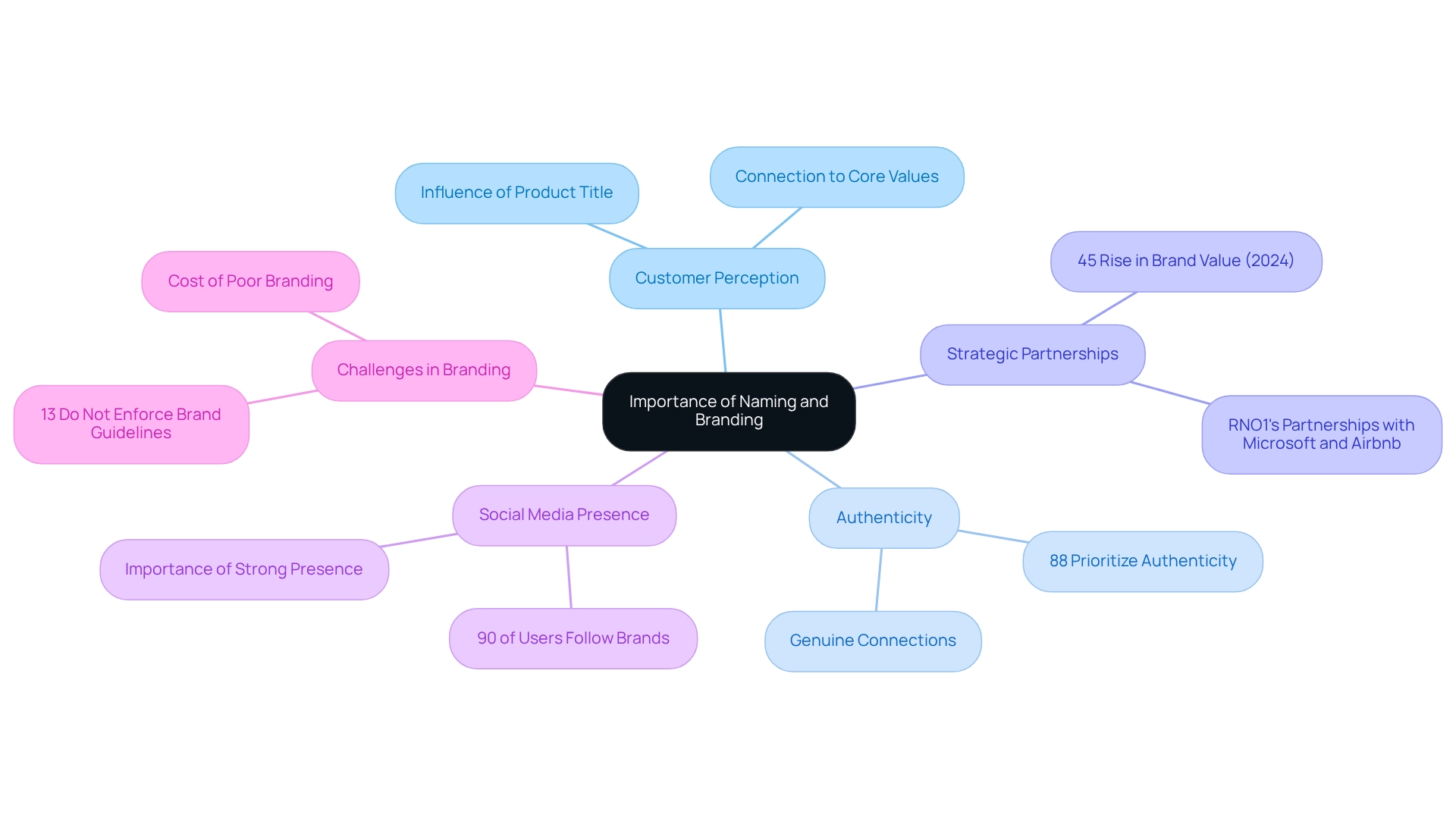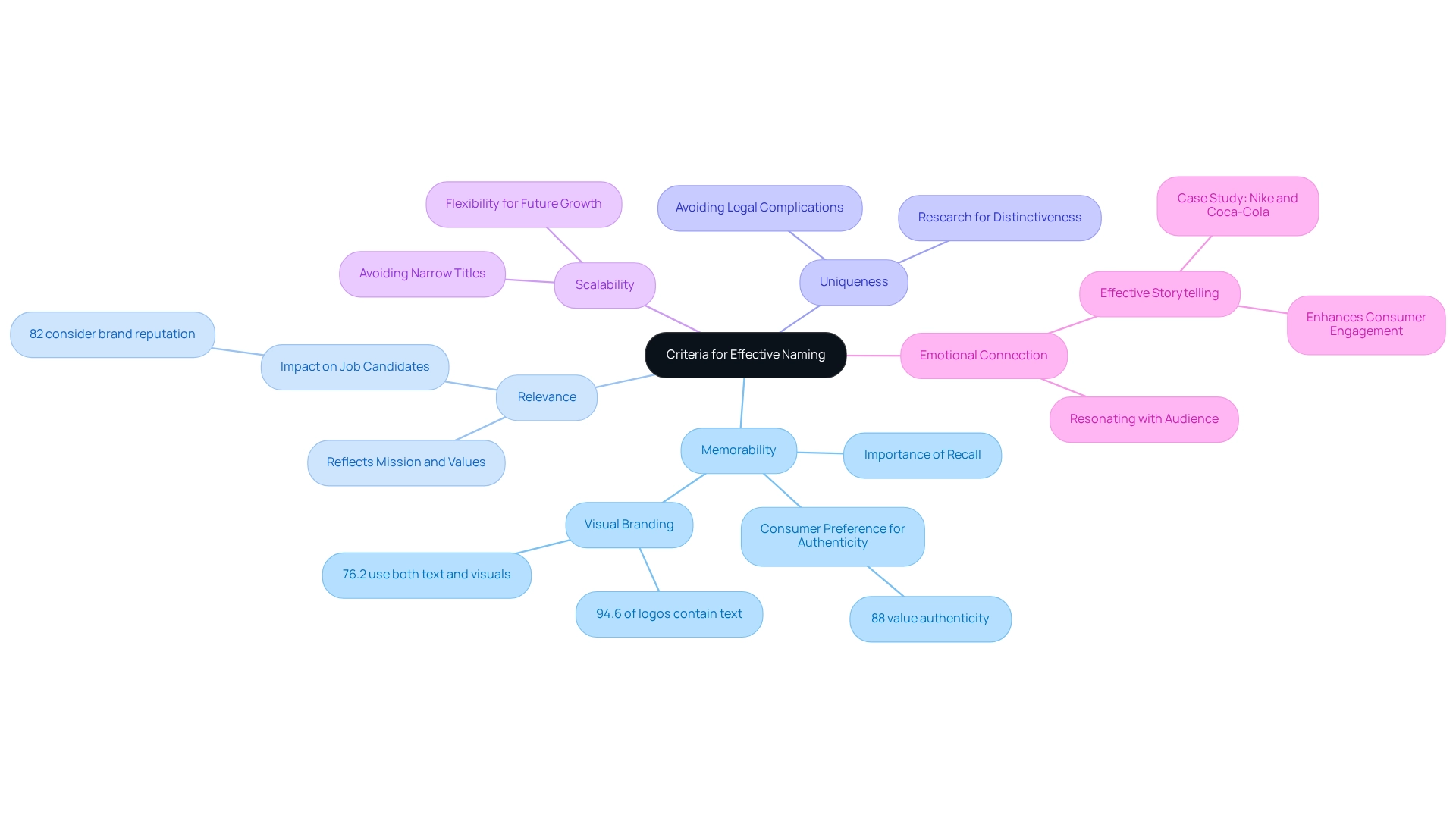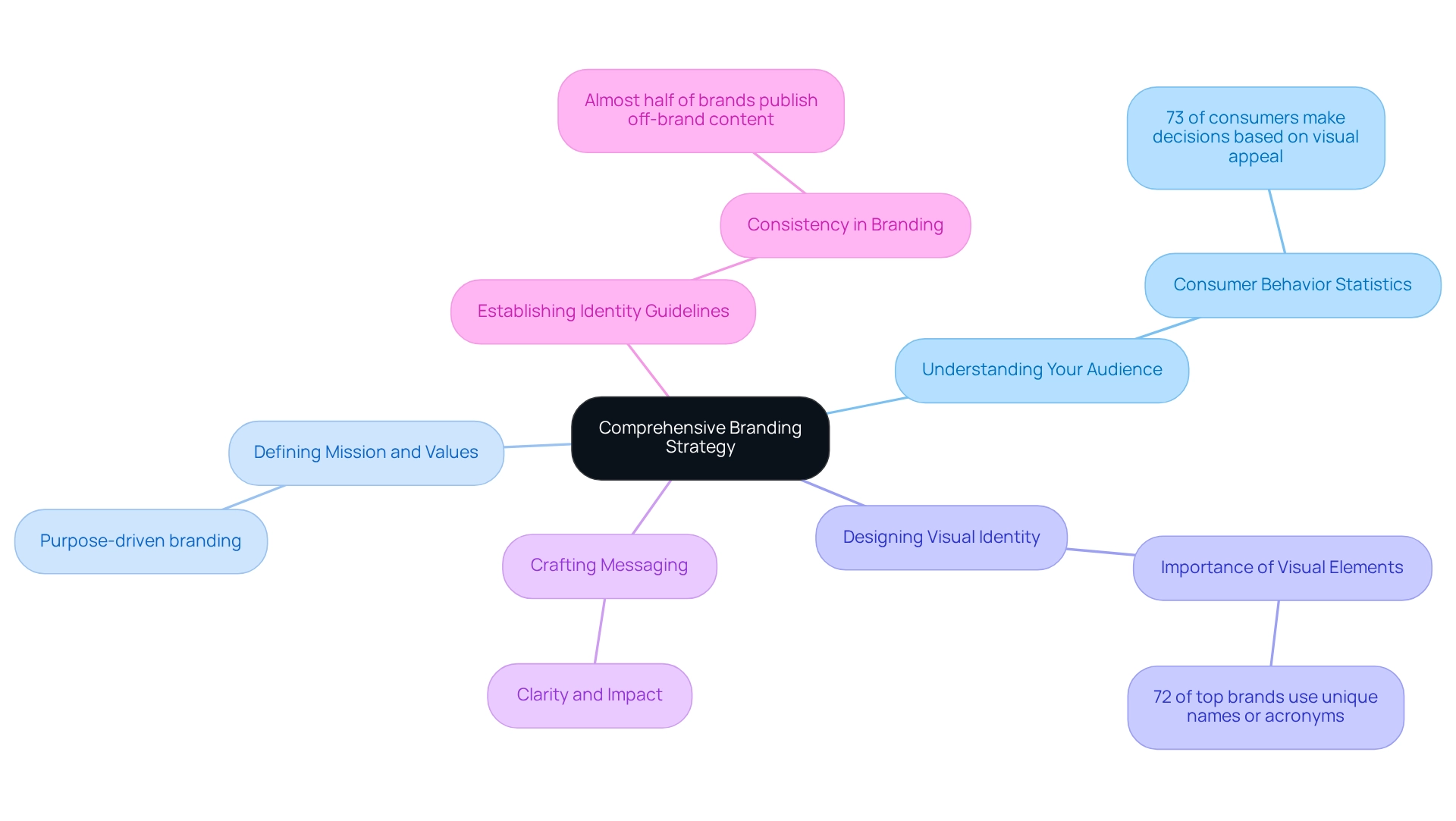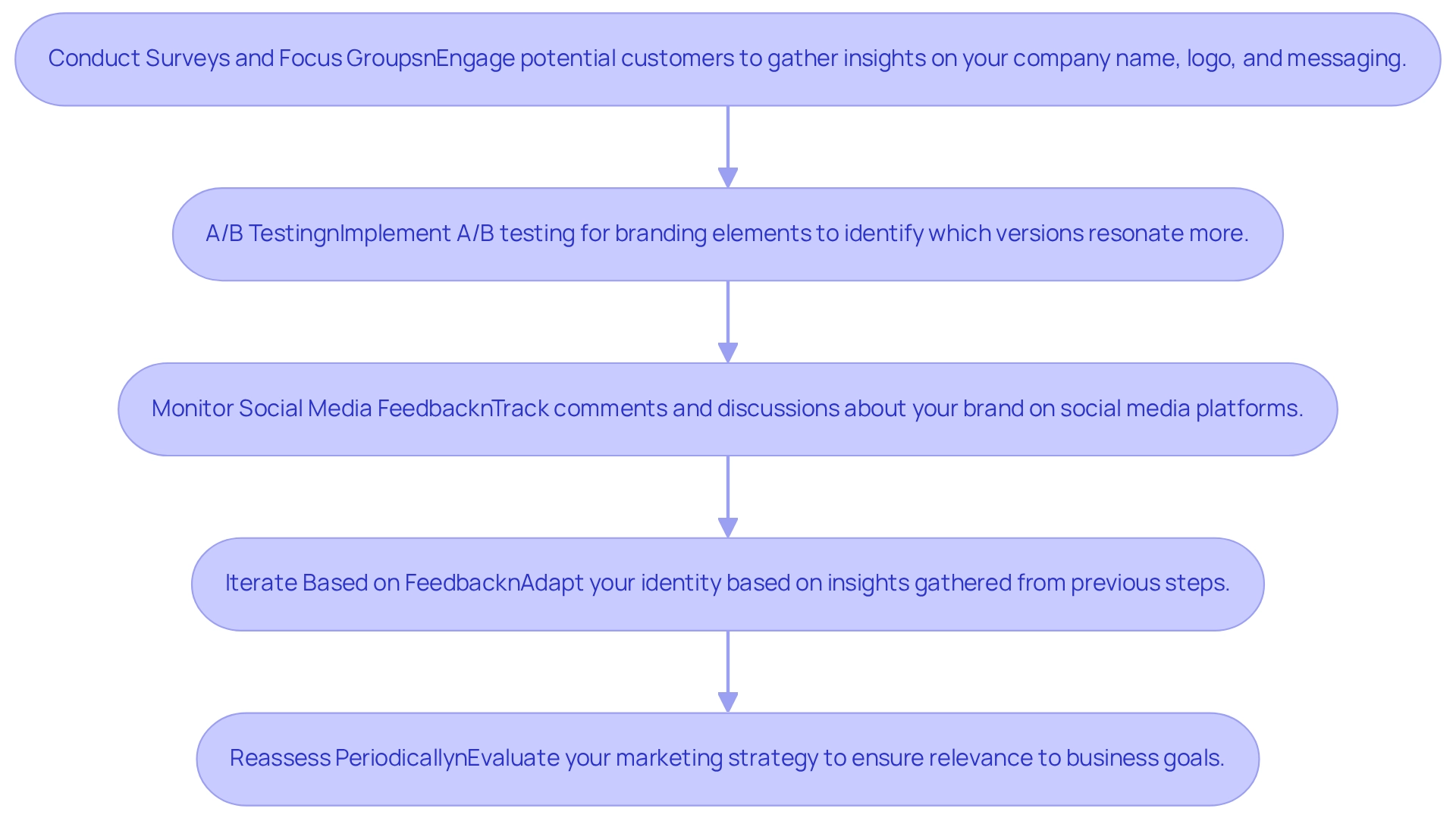Overview
In the article "5 Steps for Effective Naming and Branding in Tech Startups," we recognize a common challenge faced by many tech startup founders: the struggle to create impactful names and branding that truly resonate with their target audience. This is not just a matter of marketing; it’s about establishing a connection that speaks to the heart of your business. The implications of ineffective naming can be profound, leading to missed opportunities and a disconnect with potential customers.
To address this, the article outlines essential criteria for effective naming. We emphasize the importance of:
- Memorability
- Relevance
- Uniqueness
- Scalability
- Emotional connection
Each of these elements plays a crucial role in how your brand is perceived and can significantly influence your startup's success. Moreover, we stress the necessity of a comprehensive branding strategy that evolves alongside market dynamics and consumer feedback, ensuring that your brand remains relevant and engaging.
By adopting a thoughtful, strategic approach to naming and branding, you can foster a deeper connection with your audience, paving the way for lasting relationships and growth. Remember, you’re not alone in this journey; many founders have walked this path, and with the right guidance, you can navigate it successfully.
Introduction
In the competitive realm of tech startups, many founders struggle with the challenge of establishing a strong brand identity. This is not just a minor hurdle; it can feel overwhelming. A well-chosen brand name is more than just a label; it serves as the first impression for potential customers, encapsulating the essence of your business and its mission.
As you navigate the complexities of the digital landscape, it’s crucial to understand the nuances of naming and branding. This understanding is essential for establishing a unique market presence and fostering customer loyalty. By gaining insights into:
- Effective branding strategies
- Memorable naming criteria
- The importance of continuous refinement
You can create a compelling narrative that resonates with your audience. This, in turn, can ultimately drive growth and success in a rapidly evolving industry. Remember, you are not alone in this journey, and with the right tools and support, you can thrive.
Understand the Importance of Naming and Branding
In the tech startup environment, your naming and branding serve as the initial touchpoint for potential customers. A thoughtfully chosen title plays a crucial role in naming and branding, as it can spark curiosity, encapsulate your mission, and set you apart from competitors. However, many founders struggle with this crucial aspect. Research suggests that an appealing product title greatly influences audience perception and involvement, which are essential for your startup's success. For instance, renowned companies like Apple and Google have names that are not only memorable but also closely connected to their core values and missions. This connection fosters trust and engagement.
Moreover, statistics indicate that 88% of customers prioritize authenticity in marketing efforts. This highlights the necessity for startups to cultivate genuine connections with their audience. The cost of inadequate marketing can lead to substantial financial losses, including reduced sales and damage to reputation. It's a painful reality that many face, emphasizing the importance of a robust strategy for naming and branding, as the tech industry evolves and the influence of company names on customer perception remains crucial. In 2025, the focus on effective marketing will only intensify. Significantly, the global business technology sector experienced a 45% rise in value in 2024, demonstrating the increasing importance of identity in this area. RNO1's strategic partnerships, such as with Microsoft and Airbnb, exemplify how innovative branding can drive digital growth and enhance market presence. For instance, our partnership with Airbnb transformed RentMethod's identity, significantly disrupting the rental market.
Furthermore, with 90% of social media users following at least one company, establishing a strong presence is essential for engagement. Thus, dedicating time to grasp the subtleties of naming and branding is crucial for leaving a memorable impact and fostering growth in the competitive tech industry. It’s important to remember that startups must also be cautious; 13% of companies do not enforce their brand guidelines, which can lead to inconsistencies that weaken their marketing efforts. By addressing these challenges with care and strategic insight, RNO1 is here to support you on your journey.

Define Criteria for Effective Naming
When defining criteria for effective naming, it’s essential to consider some key aspects that resonate deeply with your journey as a startup founder.
-
Memorability: It’s vital to choose a title that is easy to recall and articulate. Intricate spellings can perplex potential clients, and research shows that 88% of consumers appreciate genuineness in marketing initiatives, which begins with a memorable title. Moreover, with 94.6% of logos featuring text and 76.2% incorporating both text and visual elements, a memorable title should be paired with strong visual branding. At RNO1, we understand that design is a top-of-mind solution that enhances both memorability and marketability.
-
Relevance: Your title should reflect your startup's mission and values, offering insight into what your business embodies. This relevance can significantly impact how potential candidates perceive your brand; a notable 82% of candidates consider a brand's reputation before applying for a job. Embracing a design-focused approach can help ensure that your identity resonates harmoniously with your core values.
-
Uniqueness: It’s crucial to conduct thorough research to ensure your brand stands out in the market. Checking for existing trademarks and domain availability can help avoid legal complications and ensure distinctiveness. A distinctive title, combined with innovative design, can truly set your brand apart in a crowded marketplace.
-
Scalability: Selecting a title that allows for future expansion is equally important. Avoid titles that are too narrow or constraining, as your business may develop in ways you cannot foresee. A flexible label, supported by RNO1's design-focused strategies, can adapt as your identity expands.
-
Emotional Connection: Aim for a name that resonates emotionally with your target audience, fostering a sense of connection and loyalty. Companies like Nike and Coca-Cola exemplify this through effective storytelling in their marketing campaigns, enhancing consumer engagement and loyalty. As highlighted in the case study 'The Effect of Brand Storytelling,' effective storytelling can establish emotional connections that greatly enhance loyalty to the company. At RNO1, we leverage design to craft narratives that resonate deeply with audiences.
By applying these criteria, you can create a name that not only captures attention but also builds a strong foundation for your brand. Remember, consistency across your brand elements is crucial; as Joshua Schmitt, Senior Graphic Designer at 4CDesignWorks, wisely notes, "The most common mistake in brand identity is inconsistency across their brand elements, using different logos, colors, or messaging across various platforms and touchpoints." Together, let’s navigate this journey to create a name that truly reflects your vision.

Develop a Comprehensive Branding Strategy
Creating a comprehensive marketing strategy can feel overwhelming for many startup founders. You might find yourself asking, "How do I truly connect with my audience?" Understanding your customers— their needs, preferences, and behaviors— is essential. Did you know that 73% of consumers make buying decisions based on a product's visual appeal? This underscores the importance of naming and branding your brand identity to align with what your audience expects. Additionally, 69% of job applicants decline offers from companies with a poor reputation, which highlights the need for a strong company image that resonates with both consumers and potential employees.
Next, it's crucial to define your brand's mission and values. Clearly articulating the naming and branding of your startup and how it sets itself apart from competitors can guide your marketing efforts and foster loyalty. Purpose-driven naming and branding, as highlighted by RNO1, can significantly enhance your product's appeal and market adoption.
Designing visual identity elements is another vital step. A logo, a color palette, and typography that reflect your brand's personality are essential for recognition. Consistency in these visual components is key; after all, 72% of top companies utilize distinctive naming and branding strategies, such as names or acronyms, that make them unforgettable. RNO1's identity design services can help your business shine in a crowded marketplace.
When crafting your messaging, aim for clarity and impact. Your value proposition should be communicated effectively and consistently across all platforms, from your website to social media. RNO1 can assist you in articulating your message in a way that truly resonates with your audience and drives engagement.
Establishing identity guidelines is also important for effective naming and branding. Create a document that outlines how your identity should be presented across various channels, including tone of voice, visual components, and messaging tactics. This ensures cohesion and professionalism. As noted by Lucidpress, nearly half of companies publish off-topic content at least several times a year, which emphasizes the importance of maintaining consistency in your identity. RNO1's strategy for naming and branding, along with experience guidelines, can help ensure your identity aligns with your mission and values.
By following these steps, you can build a robust identity strategy that integrates naming and branding, resonates with your audience, and supports your startup's growth in a competitive landscape. Remember, your brand reputation plays a crucial role in attracting talent. A case study illustrates how RNO1 assisted a tech startup in enhancing its brand image, leading to a significant increase in job applications and overall market success. You are not alone in this journey; with the right support, you can thrive.

Test and Refine Your Branding Elements
Once your identity elements are developed, naming and branding them through testing and refining is essential for your success. It can feel overwhelming, but you’re not alone in this journey. Here’s how to effectively assess your brand:
- Conduct Surveys and Focus Groups: Engage potential customers to gather insights on your company name, logo, and messaging. This feedback is invaluable for understanding public perception and can inform your naming and branding strategies. Investing in market research helps brands reduce waste and increase conversion metrics exponentially. Imagine the relief of knowing your audience's true feelings about your brand.
- A/B Testing: Implement A/B testing for various branding elements, such as logos or taglines, to identify which versions resonate more with your audience. For instance, the organization utilized A/B testing during the Founder's Haven rebranding to determine the most effective logo and messaging options, analyzing engagement metrics to guide their decisions.
- Monitor Social Media Feedback: Actively track comments and discussions about your brand on social media platforms. This real-time feedback can reveal public sentiment and highlight areas needing improvement. The organization's approach involved observing social media to assess responses to their rebranding initiatives, enabling prompt modifications.
- Iterate Based on Feedback: Be prepared to adapt your identity based on the insights you gather. Naming and branding is not a one-time effort; it requires ongoing adjustments to align with customer preferences and market dynamics. RNO1 demonstrated this by consistently enhancing their marketing strategies based on consumer feedback.
- Reassess Periodically: Regularly evaluate your marketing strategy and elements to ensure they remain relevant to your evolving business goals and market trends. This proactive strategy is essential for sustaining a competitive advantage.
By utilizing these testing techniques, you can improve your marketing components, fostering a stronger connection with your audience and enhancing your startup's market presence. It’s significant to note that 27% of consumers view personalization as essential for customer loyalty, highlighting the necessity of customizing your marketing efforts. Furthermore, 39% of consumers are willing to transition to more transparent companies, emphasizing the necessity for alignment with consumer expectations. The strategic rebranding of Founder's Haven by the organization exemplifies how thoughtful design changes can empower modern founders for digital success. This transformation highlights the effectiveness of innovative identity creation and performance marketing strategies, ultimately driving success for the company. As Leigh Ann Tucker noted, RNO1's ability to transform its naming and branding strategies while improving digital marketing effectiveness is crucial for success, illustrating the impact of strategic testing in driving brand success.

Conclusion
Establishing a strong brand identity is a challenge many tech startups face in today's competitive landscape. This journey often begins with the crucial step of choosing a brand name—one that not only makes a lasting first impression but also encapsulates the essence of your business's mission. It’s essential to recognize that effective branding strategies, memorable naming criteria, and ongoing refinement are vital components that can profoundly shape customer perception and engagement, ultimately paving the way for growth and success.
When selecting a name, consider its memorability, relevance, uniqueness, scalability, and the emotional connection it fosters with your audience. A name that resonates can nurture lasting loyalty and deeper connections with potential customers. Moreover, a comprehensive branding strategy—one that involves understanding your target audience, defining your brand's mission, creating visual identity elements, and crafting consistent messaging—serves as a solid foundation for long-term success.
Testing and refining your branding elements through surveys, A/B testing, and social media feedback is essential. This iterative process ensures your brand remains relevant and aligned with customer expectations, allowing you to adapt to market dynamics and strengthen your connection with your audience. As the tech industry evolves, the need for authenticity and effective branding becomes even more critical.
In conclusion, taking a strategic approach to naming and branding not only sets your startup apart but also lays the groundwork for sustainable growth. By dedicating time and resources to these efforts, you can create a compelling narrative that resonates with your audience, fostering engagement and loyalty in a rapidly changing environment. Embracing these principles will empower you as founders to navigate your branding journey with confidence and clarity, ultimately leading to greater success in the digital landscape.
Frequently Asked Questions
Why is naming and branding important for tech startups?
Naming and branding serve as the initial touchpoint for potential customers, sparking curiosity, encapsulating the startup's mission, and differentiating it from competitors. A well-chosen title can significantly influence audience perception and involvement, which are essential for success.
How do successful companies like Apple and Google utilize naming?
Companies like Apple and Google have memorable names that are closely connected to their core values and missions, fostering trust and engagement with their audience.
What do statistics say about customer preferences in marketing?
Statistics indicate that 88% of customers prioritize authenticity in marketing efforts, emphasizing the need for startups to cultivate genuine connections with their audience.
What are the potential consequences of inadequate marketing for startups?
Inadequate marketing can lead to substantial financial losses, including reduced sales and damage to reputation, highlighting the importance of a robust naming and branding strategy.
How is the focus on marketing expected to change in the future?
In 2025, the focus on effective marketing is expected to intensify, as the global business technology sector saw a 45% rise in value in 2024, underscoring the increasing importance of identity in this area.
Can you provide an example of successful branding through partnerships?
RNO1's partnership with Airbnb transformed RentMethod's identity, significantly disrupting the rental market and demonstrating how innovative branding can drive digital growth and enhance market presence.
Why is a strong social media presence important for companies?
With 90% of social media users following at least one company, establishing a strong presence is essential for engagement and fostering growth in the competitive tech industry.
What challenges do startups face regarding brand guidelines?
13% of companies do not enforce their brand guidelines, which can lead to inconsistencies that weaken their marketing efforts. Addressing these challenges with care and strategic insight is crucial for success.




